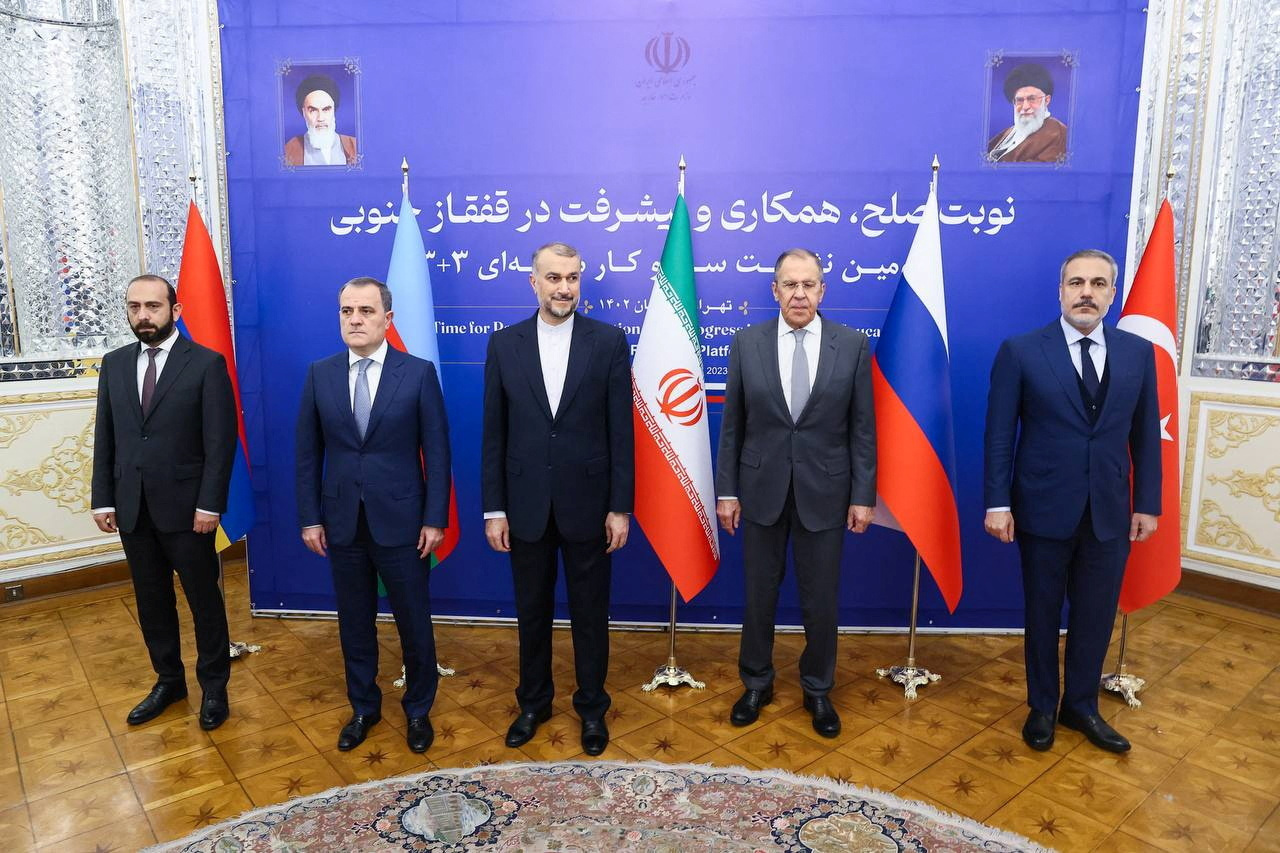The foreign ministers of Azerbaijan, Türkiye, Armenia, Iran, and Russia gathered in Tehran on Monday to discuss the issues of common interest in the new format of collective efforts, known as the Consultative Regional Platform "3+3".
The second 3+3 summit highlighted a series of issues, including political, economic, transport, and cultural.
Although the Georgian government refused to attend, the meeting addressed the key questions pertaining to the domestic and foreign policy agenda of the regional nations.
Azerbaijan’s Foreign Minister Jeyhun Bayramov said at the summit that the 3+3 platform presents significant potential to complement existing bilateral and other cooperation formats, strengthen security and stability in the region, and reveal untapped potential for economic growth.
According to him, mutual respect for sovereignty, territorial integrity, inviolability of borders, and non-interference in internal affairs should form the cornerstone of collective efforts and regional cooperation.
Bayramov also weighed in on the growing importance of joint transport networks for the region, including the Baku-Tbilisi-Kars railway project of Azerbaijan, Türkiye, and Georgia, and the North-South Transport Corridor involving Azerbaijan, Iran, and Russia.
The commissioning of the transport links between Azerbaijan's East Zangezur economic region and Nakhchivan Autonomous Republic through the territory of Iran will serve mutually beneficial bilateral cooperation, as well as create a new connection artery to leverage the transport and transit potential in Eurasia, the Azerbaijani minister noted.
Bayramov’s Iranian counterpart Hossein Amir-Abdollahian reaffirmed the joint efforts of companies from Baku and Tehran to restore the direct connection between Azerbaijan’s mainland and Nakhchivan via the Islamic Republic’s territory.
“We believe that today is a historic opportunity for all our countries. The war in the South Caucasus is now over and the time has come for peace, cooperation and development in the Caucasus,” IRNA quoted Amir-Abdollahian as saying.
The South Caucasus region witnessed one of the world’s most protracted conflicts between Armenia and Azerbaijan over the latter’s Karabakh (Garabagh) region. Following the Soviet Union’s dissolution in 1991, Armenia launched full-blown military aggression against Azerbaijan, marking the longest and deadliest war in the South Caucasus region. The bloody war ended with a ceasefire in 1994 and saw Armenia forcibly occupying 20 percent of Azerbaijan’s internationally recognized territories. Over 30,000 Azerbaijanis were killed, nearly 4,000 went missing, and one million were expelled from those lands in a brutal ethnic cleansing campaign conducted by Armenia.
On September 27, 2020, the Armenia-Azerbaijan conflict took a violent turn when Armenia’s forces deployed in occupied Azerbaijani lands shelled military positions and civilian settlements of Azerbaijan. During counter-attack operations, which lasted 44 days, Azerbaijani forces liberated over 300 settlements, including the cities of Jabrayil, Fuzuli, Zangilan, Gubadli, and Shusha, from a nearly 30-year-long illegal Armenian occupation. The war ended with the signing of a statement on November 10, 2020, under which Armenia also returned the occupied Aghdam, Kalbajar, and Lachin districts to Azerbaijan.
Shortly after the 2020 war, the Azerbaijani authorities voiced readiness and determination to launch negotiations with Armenia that would ultimately bring the long-awaited peace to the region. In March 2022, Baku submitted five basic principles to Yerevan, including mutual territorial integrity recognition and border delimitation activities.
Since the end of the war, there have been a series of high-level meetings between Azerbaijan and Armenia mediated by Russian, European, and American officials.
Minister Bayramov said in Tehran that ending the occupation of Azerbaijani territories and fully restoring the country’s sovereignty opens a new perspective for the normalization of relations between Baku and Yerevan.
He reiterated Azerbaijan’s fair and equal peace proposal based on mutual respect for each other's legitimate interests and expectations for mutual steps and a constructive approach from Armenia in order to quickly conclude the issues pertaining to the peace agreement.
Turkish Foreign Minister Hakan Fidan, for his part, stated that the path to regional peace and stability is through a comprehensive peace agreement between Azerbaijan and Armenia, and the opening of regional transport links will accelerate the normalization and peace processes.
Russia’s Foreign Minister Sergei Lavrov said Armenia and Azerbaijan settled the main unresolved problem between them by agreeing that the Karabakh region belongs to Azerbaijan. According to him, there should be practical steps to fully normalize relations, primarily to prepare a peace treaty, delineate borders, and establish transport economic ties without any obstacles.







 President Ilham Aliyev shed light on the evolving contours of the peace process with Armenia during an international conference in Baku this week. ...
President Ilham Aliyev shed light on the evolving contours of the peace process with Armenia during an international conference in Baku this week. ...
 Azerbaijan and Armenia started the process of demarcation of their border on Tuesday, with the installation of the first border markers based on ge...
Azerbaijan and Armenia started the process of demarcation of their border on Tuesday, with the installation of the first border markers based on ge...
 Armenian sappers commenced on Monday mine-clearance operations in the territories adjacent to the Saint Mary Church in village of Voskepar (Armenia...
Armenian sappers commenced on Monday mine-clearance operations in the territories adjacent to the Saint Mary Church in village of Voskepar (Armenia...
 Iran and Pakistan have signed eight cooperation documents in various fields, and agreed to strengthen ties to fight terrorism in the region.
Iran and Pakistan have signed eight cooperation documents in various fields, and agreed to strengthen ties to fight terrorism in the region.
 As the conflict between Ukraine and Russia escalates, the strategic importance of Kharkiv, Ukraine's second-largest city, has come sharply into focus.
As the conflict between Ukraine and Russia escalates, the strategic importance of Kharkiv, Ukraine's second-largest city, has come sharply into focus.
 President Aliyev emphasized the critical role of the North-South Transport Corridor in fostering transport cooperation between Azerbaijan and Russi...
President Aliyev emphasized the critical role of the North-South Transport Corridor in fostering transport cooperation between Azerbaijan and Russi...



